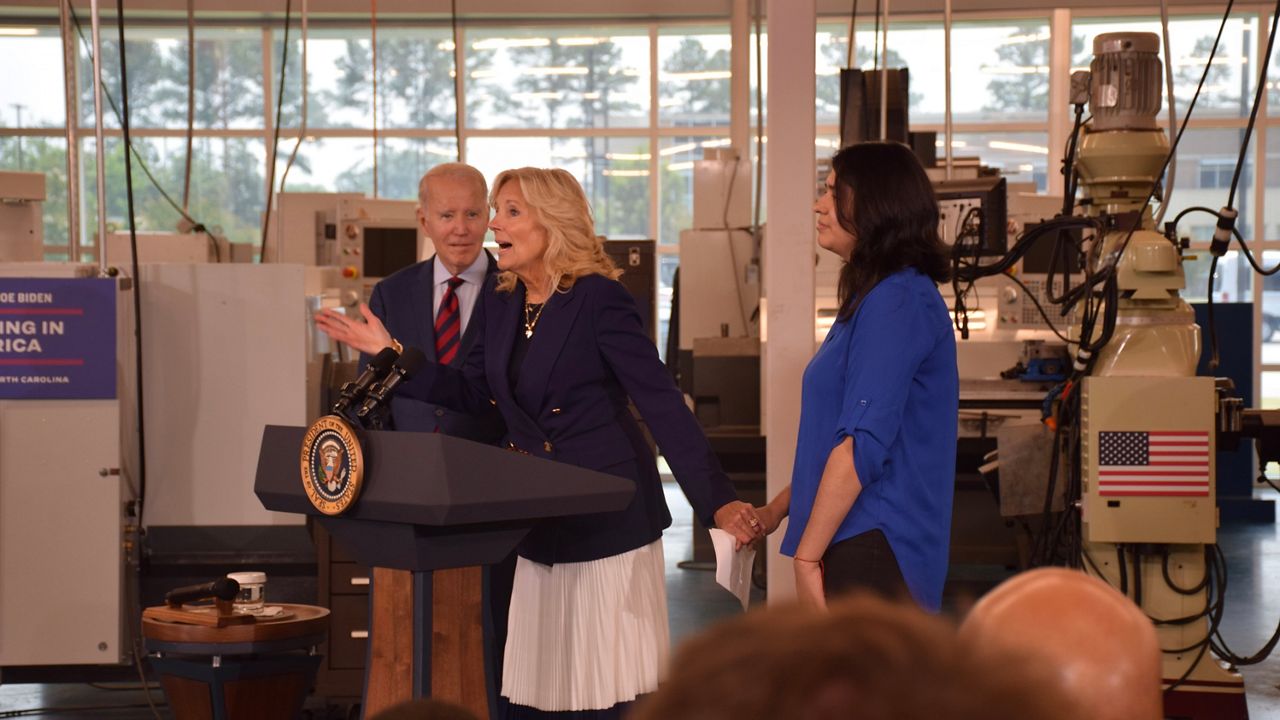RALEIGH, N.C. — More than half of a million people were enrolled across the state’s 58 community colleges in 2021-2022, according to the North Carolina Community College System. President Joe Biden and first lady Dr. Jill Biden’s recent visit to Nash Community College brought attention to the importance of those educational resources creating a prepared workforce.
Wake Technical Community College is the state’s largest community college with about 70,000 students attending the college every year.
“We train about 300 automotive technicians at the state-of-the-art Hendrick Center for Automotive Excellence,” said Dr. Scott Ralls, the president of Wake Tech.
At Wake Tech, students are immersed in opportunity.
“We prepare people for jobs that keep Wake County running, for jobs that keep Wake County safe and healthy and jobs that help Wake County grow and be prosperous,” Ralls said. “Whether that be biotech, biopharma, new forms of advanced manufacturing, the latest in IT and computer areas, STEM opportunities or the vast array of technical and trade opportunities from HVAC and electrician to culinary and baking to everything you could imagine.”
Ralls has more than 25 years of experience in the community college sector.
“Personally, it's where I get my inspiration because of students and the people who are coming to community colleges to better themselves, better their families, better our communities,” Ralls said.“Personally, it's where I get my inspiration because of students and the people who are coming to community colleges to better themselves, better their families, better our communities,” Ralls said.
Ralls says Wake Tech is among the higher education resources helping to better prepare tomorrow’s workforce.
“We're one of the fastest growing regions in the country, and this is a place where people see the opportunity to grow with the region,” Ralls said. “Our goal, unlike some colleges where rightly and understandably, they're so proud of their exclusivity, we're even more proud of our inclusivity.”
According to Ralls, Wake Tech is on the upswing after enrollment numbers dipped at the start of the pandemic. He believes more and more people are realizing the value of community colleges.
“There's a stigma around community colleges. Sometimes community colleges, we're seen as the place you would go when you couldn't go another place, and that's what's really changed about community colleges,” Ralls said.
He believes community colleges offer a unique approach to preparing the workforce of tomorrow, because they’re deeply connected to the needs of the area.
“That's what I think makes community colleges unique, is that we're grounded in our communities, and we listen to our communities. We work with our communities, and then we work with our students to help them bridge. And as we like to say, at Wake Tech to ladder up to those opportunities,” Ralls said.
As for challenges community colleges face, Ralls says the salaries they can afford to pay can be an obstacle. They’re trying to balance being affordable for students while also paying faculty and staff competitive wages.
“A lot of times the students can walk out of our program and make more money within a matter of a year or two than the people who just taught them what to do,” Ralls said. “None of the instructors you talked to in there will say, ‘I came here to make money.’ When you work at a community college, you're not going to make money at the same level you would in the private sector. The biggest challenge for us, though, is when the differential becomes too great.”
Different community colleges also offer varying perks around the state to make things even more affordable. In the fall, Wake Tech is offering an opportunity where students in degree programs can pay a flat fee to rent books instead of buying each one separately.







